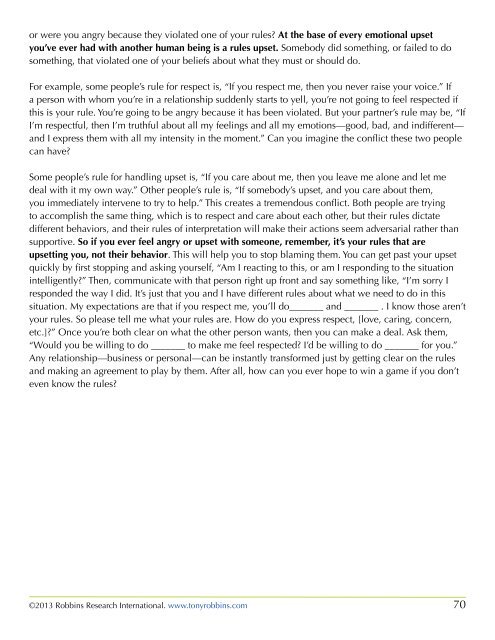Tony Robbins -Re-Awaken_the_Giant_Within
- No tags were found...
You also want an ePaper? Increase the reach of your titles
YUMPU automatically turns print PDFs into web optimized ePapers that Google loves.
or were you angry because <strong>the</strong>y violated one of your rules? At <strong>the</strong> base of every emotional upset<br />
you’ve ever had with ano<strong>the</strong>r human being is a rules upset. Somebody did something, or failed to do<br />
something, that violated one of your beliefs about what <strong>the</strong>y must or should do.<br />
For example, some people’s rule for respect is, “If you respect me, <strong>the</strong>n you never raise your voice.” If<br />
a person with whom you’re in a relationship suddenly starts to yell, you’re not going to feel respected if<br />
this is your rule. You’re going to be angry because it has been violated. But your partner’s rule may be, “If<br />
I’m respectful, <strong>the</strong>n I’m truthful about all my feelings and all my emotions—good, bad, and indifferent—<br />
and I express <strong>the</strong>m with all my intensity in <strong>the</strong> moment.” Can you imagine <strong>the</strong> conflict <strong>the</strong>se two people<br />
can have?<br />
Some people’s rule for handling upset is, “If you care about me, <strong>the</strong>n you leave me alone and let me<br />
deal with it my own way.” O<strong>the</strong>r people’s rule is, “If somebody’s upset, and you care about <strong>the</strong>m,<br />
you immediately intervene to try to help.” This creates a tremendous conflict. Both people are trying<br />
to accomplish <strong>the</strong> same thing, which is to respect and care about each o<strong>the</strong>r, but <strong>the</strong>ir rules dictate<br />
different behaviors, and <strong>the</strong>ir rules of interpretation will make <strong>the</strong>ir actions seem adversarial ra<strong>the</strong>r than<br />
supportive. So if you ever feel angry or upset with someone, remember, it’s your rules that are<br />
upsetting you, not <strong>the</strong>ir behavior. This will help you to stop blaming <strong>the</strong>m. You can get past your upset<br />
quickly by first stopping and asking yourself, “Am I reacting to this, or am I responding to <strong>the</strong> situation<br />
intelligently?” Then, communicate with that person right up front and say something like, “I’m sorry I<br />
responded <strong>the</strong> way I did. It’s just that you and I have different rules about what we need to do in this<br />
situation. My expectations are that if you respect me, you’ll do_______ and _______ . I know those aren’t<br />
your rules. So please tell me what your rules are. How do you express respect, [love, caring, concern,<br />
etc.]?” Once you’re both clear on what <strong>the</strong> o<strong>the</strong>r person wants, <strong>the</strong>n you can make a deal. Ask <strong>the</strong>m,<br />
“Would you be willing to do _______ to make me feel respected? I’d be willing to do _______ for you.”<br />
Any relationship—business or personal—can be instantly transformed just by getting clear on <strong>the</strong> rules<br />
and making an agreement to play by <strong>the</strong>m. After all, how can you ever hope to win a game if you don’t<br />
even know <strong>the</strong> rules?<br />
©2013 <strong>Robbins</strong> <strong>Re</strong>search International. www.tonyrobbins.com 70


